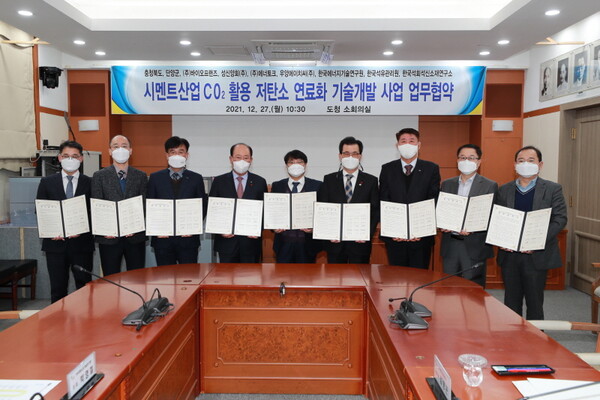[Notice] Finding a Net-zero Carbon Capture Utilization Technology from the Cement Industry
Biofirends Admin
view : 1090

▲[MOU Signing Ceremony for Developing Low-carbon Fuelization Technology Using CO2 from the Cement Factory; Chungbuk Provincial Office]
At the 2021 United Nations Climate Change Conference (COP26) which was held in Glasgow, the United Kingdom, each country agreed to choose the “Glasgow Climate Pact”, which is about gradually reducing the coal power plant. In addition, developed countries concurred to increase the climate change adjustment fund by twice the amount by 2025. At this meeting, each country planned to readjust the “2030 Nationally Determined Contributions (NDCs)” in accordance with the global temperature increase of 1.5 degrees Celsius. Even if it is a bit late for such readjustment, it is still believed to be the right time for all industries to contribute to the establishment of a proper industrial ecosystem that meets the greenhouse gas reduction goal.
Numerous scientists have been stressing that the recent severe climate change is all because of greenhouse gas accumulation for at least over 20 years. Therefore, they worry that if we do not reduce greenhouse gas emissions by “0” in 10 years, there might be a big possibility for the current humanity to undergo even more serious climate change and other major natural disasters.
Due to this point of view, the Government of South Korea has announced the carbon neutrality plan and 2030 NDCs. In addition, all industries have recently declared that they will promptly change their industrial ecosystem. Especially, the NDC goal in the cement and steel industrial sectors is to reduce greenhouse gas emissions by 14.5% compared to 2018 and approximately 10.3 million tons of CO2 through the Carbon Capture Utilization, and Storage industries. Therefore, Bio Friends, Inc. (Dr. Wonjun Cho, CEO) has been selected to supervise the “Technological Development of Low Carbon Energy Synthesis by Utilizing Captured CO2 from the Cement Industry – Carbon Capture and Utilization (CCU) Field.”. In addition, three industrial companies, SUNGSHIN CEMENT Co., Ltd., ENERTORK, Inc., and WOOYANG HC, Inc., and four government agencies, Korea Institute of Energy Research, Korea Petroleum Quality & Distribution Authority, and Korea Institute of Limestone & Advanced Materials, were selected to a consortium led by the government-contributed research institute. Such consortium will lead CCU technology which produces methanol from CO2 emitted from the cement industry in Chungcheongbuk-do. Local governments such as Chunceongbuk-do (Lee Si-Jong, Provincial Governor) and Danyang-gun (Ryu Han-Woo, Mayor) are actively participating in this project. On December 27, 2021, there was an MOU signing ceremony in a Chungcheong-do provincial office to closely cooperate for the success of this project.
By applying Korea’s first CCU technology, which is to chemically convert captured CO2 from the cement production process, this brand-new net-zero technology captures both fine dust and CO2 at the same time to refine these into syngas and finally transform this syngas into methanol, which is considered as a chemical platform. The goal of the project is to construct a demonstration complex focusing on research facilities that can produce more than 10,000 tons per year of methanol. In particular, in order to secure economic feasibility, a private sector will promote a blue hydrogen project and a chemical conversion of methanol into a high value-added dimethyl ether (DME), which is used as a clean chemical compound and a fuel. DME produced from the captured CO2 and unused energy sources will be used as a renewable DME.
This KRW 39 billion project (Central government funding: KRW 21 billion, local government: KRW 3 billion, and private sector: KRW 15 billion) will construct research facilities in Sung Shin’s cement factory area located in Danyang-gun, Chungbuk by 2025. South Korea is importing 1.8 million tons of methanol. As South Korea’s methanol supply is 100% depending on import, it is expected that this new technology will be able to replace import of methanol and be a good ‘license out’ business model.
A staff member of Bio Friends, Inc. explained, “If we succeed in producing rDME, which can be used as a DME-LPG blended fuel, through chemical conversion using CCU technology, we will be able to not only reduce the emission of greenhouse gas, but also create a monumental ripple effect on the industries that are closely related with the cement industry, such as steel and iron industry.” Therefore, it is expected that we can reach to the NDCs’ goal by constructing large-scale of CO2 capture complex, more than 2 million tons per year, and by commercializing 150,000 tons per year of plant by the year of 2030 through gradual scaling-up of this project.


 02 - 6739 - 1100~3
02 - 6739 - 1100~3 bftech@bfi.co.kr
bftech@bfi.co.kr